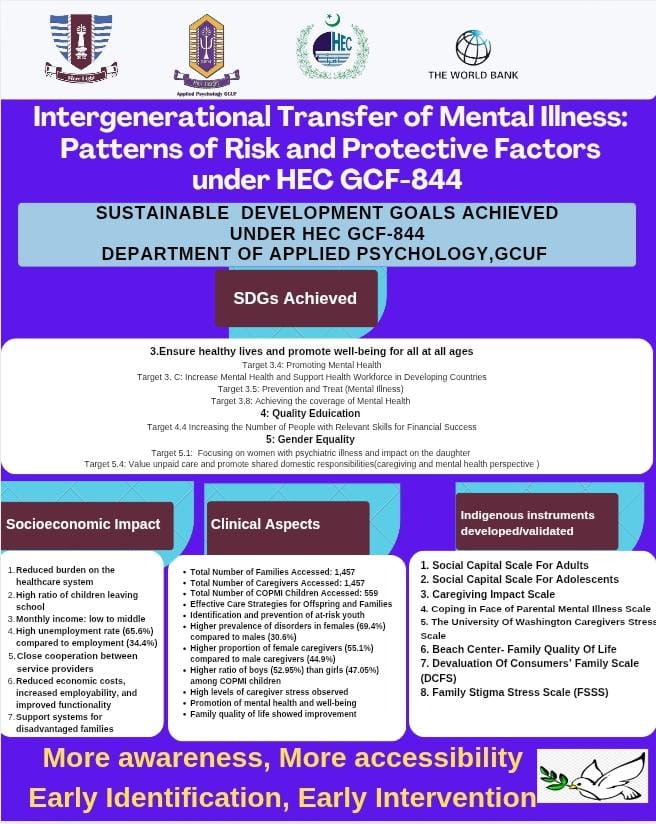- About
- Project Team
- Project Personnel
- Data Collection Sites
- Events
- Publications / Newsletter
- Research Resource Center
- Policies and SDGs
Mental health issues are common, and they are accompanied by significant public and economic costs, social inequality, and disability-adjusted life years (Stracke et al., 2019; GBD, 2019). Almost 10 to 20 percent of children and adolescents suffer from mental disorders globally (WHO, 2017,2018, 2019). In Pakistan, alarming rates of adolescent mental health issues, such as anxiety depression, psychosis, etc. have been reported by researchers (Ashraf at al., 2021 Shah et al., 2022).
Parental illness is one of the main early year’s risk factors for socioeconomic disparities in children and adolescent mental health (Straatmann et al., 2018, Office for National Statistics, 2015; Wickham at al., 2016). Offsprings of parents with mental illness are vulnerable to develop greater internalizing and externalizing problems and experience a marginalized position in society due to economic disadvantage, living conditions, lack of social support, experience of social stigma, fewer educational opportunities (Källquist & Salzmann-Erikson, 2019).
Individual differences in genetic make-up may interact with exposure to maladaptive socio-economic and family environments, maladaptive parenting and personal psychological mechanisms, in explaining the transfer of psychopathology to the next generation (Silberg, at l.,2011, WHO, 2022). The present research takes an ecological perspective to unravel the pattern of intergenerational transfer of mental illness by addressing different social, familial and personal risk and protective factors. The project basically aims at early identification of youth at risk of developing mental health problems as result of their parents’ mental illness. The research encourages the involvement of children, young people and their care givers in the development and implementation of health promoting interventions. This project under the theme of Non-Communicable Diseases, Population Health and Genomics directly deals with public mental health and may also relate indirectly to social and economic development of the country.
Project Team

Prof. Dr. Rabia Khawar
Principal Investigator
Dr. Rizwana Amin
CO - Principal Investigator
Prof. Dr. Imtiaz Ahmad Dogar
Sectoral Collaborator 1

Ms. Hira Ahmad
Research CollaboratorProject Personnel (year 1)

Ms. Samavia Hussain
PHD Scholar
Ms. Memoona Aslam
Research Assistant
Ms. Rooha Butt
MS ScholarData Collectors Team (10)
Project Personnel (year 2)

Ms. Samavia Hussain
PHD Scholar
Ms. Memoona Aslam
Research Assistant
Ms. Mehwish
MS ScholarData Collectors Team (10)
Project Personnel (year 3)

Ms. Samavia Hussain
PHD Scholar
Ms. Memoona Aslam
Research Assistant
Ms. Sahar Mahmood
MS StudentshipData Collectors Team (10)
Data Collection Sites (year 1)
- Department Of Psychiatry & Behavioral Sciences, DHQ Hospital Faisalabad)
- Department Of Psychiatry & Behavioral Sciences Jinnah Hospital Lahore
- Department Of Child & Family Psychiatric King Edward Medical University & MAYO Hospital,Lahore
- Department Of Psychiatric & Behavioral Sciences Nishtar Medical University & Hospital Multan
- Institute Of Psychiatric ,Rawalpindi Medical University
Data Collection Sites (year 2)
- Department Of Psychiatry & Behavioral Sciences, DHQ Hospital Faisalabad)
- Department Of Psychiatry & Behavioral Sciences Jinnah Hospital Lahore
- Department of Psychiatry Lahore General Hospital
- Department Of Psychiatric & Behavioral Sciences Nishtar Medical University & Hospital Multan
- Institute Of Psychiatric ,Rawalpindi Medical University
Publications
Conceptualization of Social Capital in Mental Health Context among Adolescents and Adults
This study explores the role of social capital in mental health among different age groups, analyzing its impact on psychological well-being and resilience.
Read Full Article / DOI →Translation and Validation of Family Stigma Stress Scale (FSSS) Among Caregivers of Patients With Mental Illness in Pakistan
This research validates the Family Stigma Stress Scale (FSSS) for caregivers, ensuring accurate assessment of stigma-related stress in the context of mental health care.
Read Full Article / DOI →Stress, Psychological Distress, and Cognitive Coping Strategies in Caregivers of Patients With Depressive Disorders in Pakistan
This paper examines how caregivers of individuals with depressive disorders manage stress and psychological burden, focusing on their cognitive coping mechanisms within the cultural context of Pakistan.
Read Full Article / DOI →Explore groundbreaking research in mental health and social well-being.
Policy Brief - ICIMI 2024
1st International Conference on Intergenerational Transfer of Mental Illness (ICIMI-2024)
presents key research findings, policy recommendations, and strategic interventions to address mental
health challenges across generations. This document provides crucial insights for policymakers,
healthcare professionals, and researchers.
Sustainable Development Goals (SDGs)
For further inquiries, please contact the Applied Psychology Department,
Government College University Faisalabad.


